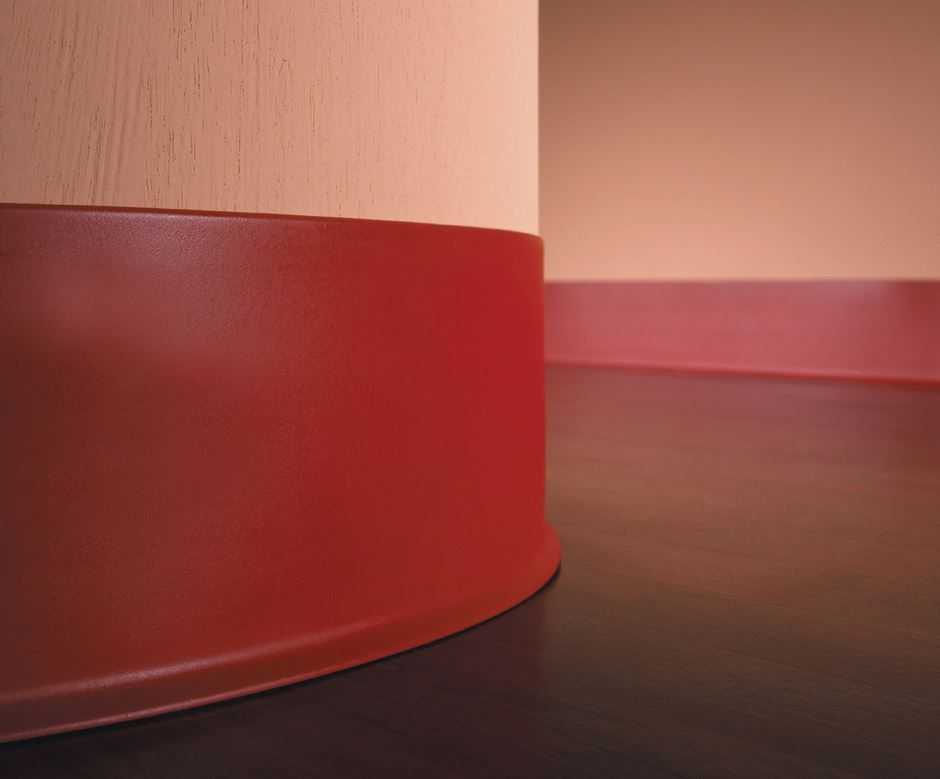When Budgets Matter – Options for Cost Effective Flooring
It is a unique time in the world. More than ever, budgets are at the forefront. Continental Flooring has helped buyers balance budgetary constraints for more than 40 years. There are a number of high-quality flooring options that won’t break the bank and can transform your facility. With advancements in commercial flooring technology, there are a number of cost-effective products that are durable, strong, and attractive as well.
Vinyl
Vinyl has been a main stay and go-to flooring product for decades. There are few options within the vinyl family, most of which are relatively inexpensive, water-resistant, durable and low maintenance. The sky is the limit on style, color, and texture, including vinyl products that have the appearance of stone, terrazzo, wood, and marble. Vinyl comes in sheet, plank, and tile formats.
It’s no secret that LVT (luxury vinyl tile) has established itself as one of the toughest surfaces in the flooring world. Major manufacturers, including Armstrong (with their Diamond 10 technology), Shaw, Mannington and Congoleum have embraced its durability, stability, and wide range of design options. Versatile and strong, LVT can wear a number of hats. It can look like any tile from ceramic and travertine to slate and marble, while the wood creations have become increasingly popular and mimic a spectrum of hardwood and laminate floors. The natural appeal of the LVT planks (available in authentic plank lengths and widths like real hardwood) has opened up a new design look for commercial installations. Available in a variety of gauges and standard sizes, LVT options can work within almost any budget.
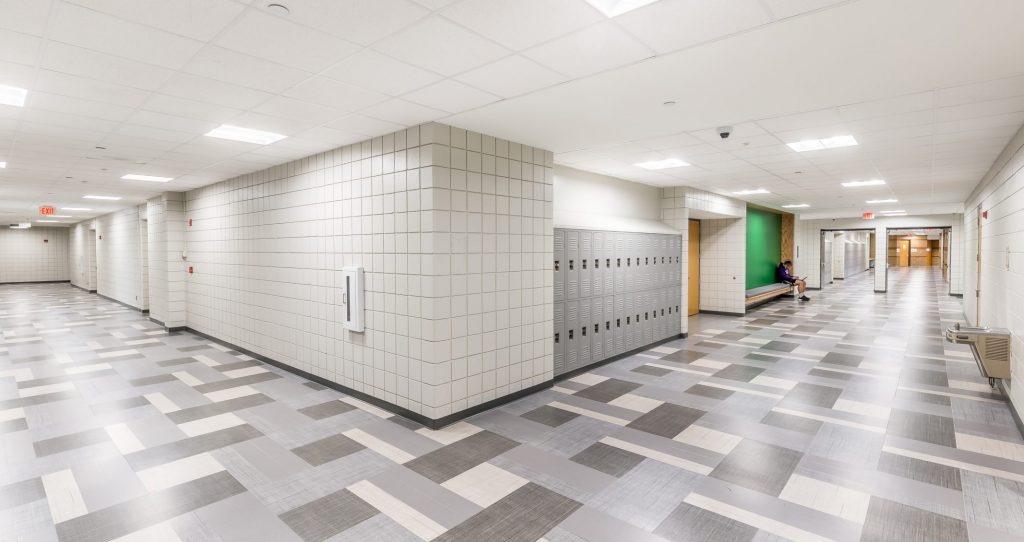
Durability is the key. Hard surface flooring has notoriously been difficult to maintain, but even in the toughest of environments, LVT usually offers an outstanding flooring solution. It is commonly thought that LVT’s design layer will wear away over time, but that is not at all the case. The design on LVT is printed directly on the film layer of the tile, which is further protected by the wear layer. This gives the floor a protective, clear layer that makes it tough as nails and the design layer will never be walked off.
Because of its protective wear layer, LVT is scratch and scuff resistant and doesn’t need waxing or polishing. Instead, this surface only requires mopping and sweeping to maintain its “looks like new” appearance. The ease of maintenance will also save money in care costs over the life of the floor. LVT is constructed from synthetic material so by its very nature it is resistant to moisture and climate. When installed correctly, LVT is also water resistant and comes with a warranty of up to 20 years. (Be sure to ask about LVT specifically designed for wet areas.) Now that’s a tough floor! LVT has wear layers coated with urethane to make them even stronger and suitable for tough traffic. A vacuum and damp mop takes care of maintenance, making it a product to consider for almost any installation.
Vinyl Composition Tile (VCT) is always an economical option and is typically at a lower initial price point than other types of flooring. These through-pattern tiles are a mixture of natural limestone, fillers, color pigments and a thermoplastic binder, making the tile extremely resilient and ideal for high traffic areas and areas with heavy rolling loads. There is virtually an unlimited number of patterns, colors, styles, and finishes that can be installed in a wide variety of applications. Though the tile is extremely durable and long-lasting, VCT is higher maintenance (stripping, waxing, polishing) than other vinyl floors and the life cycle costs should also be calculated and considered.
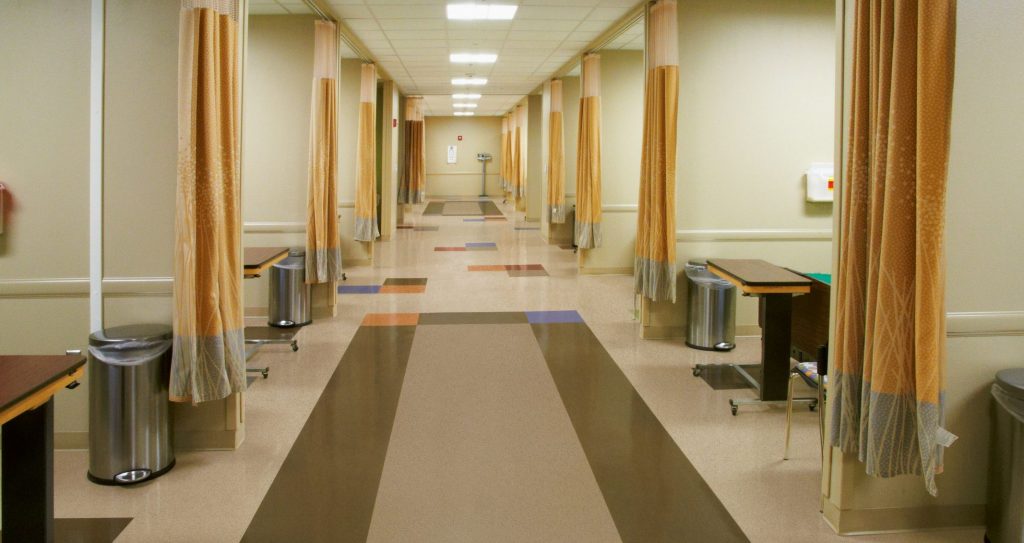
Ideal for heavy traffic, this product generally comes in 4, 5, and 6-foot wide rolls and 2-3 millimeter in thickness in a variety of patterns. This allows for a minimal number of seams and this can be a key factor where aesthetics are a concern. Some single solid sheet products can be installed over many subfloors and conditions (reducing cost of floor prep) and contain Scotchgard Protector to repel dirt and grime. The density of the material holds up against scuffs and gouging. Sheet vinyl flooring has been a mainstay in public housing, hospitals and healthcare but can be used in any number of other facilities or situations. Sheet vinyl can be flash coved, which will create a monolithic, seamless floor that is easy to clean and maintain. This surface is also excellent for repelling microorganisms. Sheet vinyl can also be heat welded for sanitary restrictions.
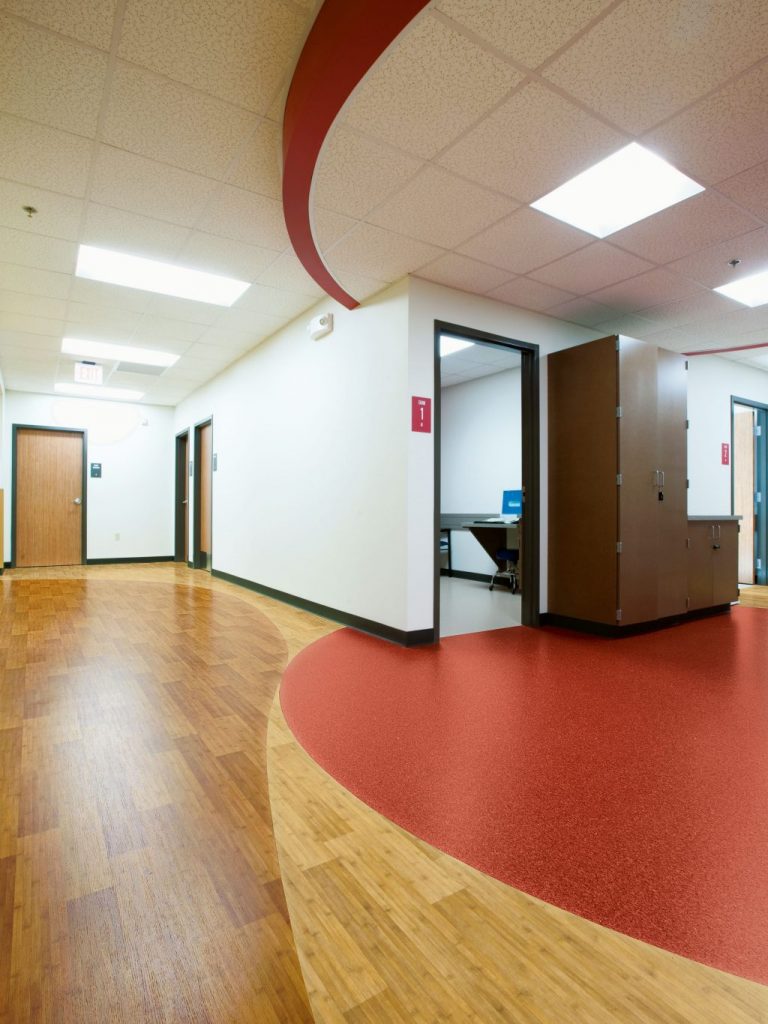
Low maintenance “safety sheet vinyl” (no buffing or polishing) is available and offers slip-resistant, sure-grip texture and has through-pattern construction which means the slip retardant won’t wear off. There are also glue down, floating options that are typically more economical than tile flooring.
Vinyl and Rubber Wall Base
To create a finished affordable look for your floor, a blended resilient rubber and vinyl base provides flexible solution. With varying heights and gauges, the right base can conceal floor and wall irregularities. This kind of base is designed not to fade, crack or chip and will hold up well under tough conditions.
Constructed from clay, water, and minerals, ceramic tile is synonymous with affordability and durability. Ceramic tile can be used in any kind of public building and is very dense which also allows it to hold up well in wet areas. Being nonporous ceramic won’t absorb moisture or bacteria. From a design perspective, the options are almost limitless since it can be glazed with virtually any color from bright and pigmented hues to neutral and earth tones.
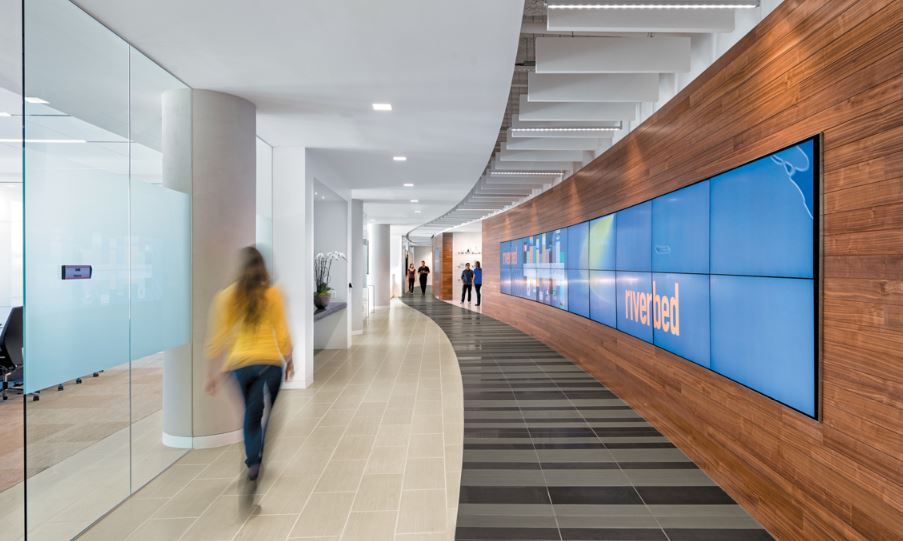
Porcelain tile is a type of ceramic tile that is fired at higher temperature making it chip resistant, and even more dense and durable. This level of durability creates a long-life cycle for the floor, which equates to long term savings. Like the ceramic, it can be in almost any color or pattern. Because porcelain is even less absorbent than ceramic, it’s naturally more stain resistant and can easily withstand outdoor use and weather changes. (Keep in mind that some porcelain is manufactured specifically for outdoor use so always specify your usage with our sales team.) Porcelain can be used on both walls and floors, as well as countertops.
Both types of tile have slip-resistant options and are produced in an almost unlimited choice of colors. Both tiles be manufactured to mimic natural stone or wood. Plank tile is a perfect application in areas where real wood is desired but is unable to withstand moisture or high traffic issues. Commercial porcelain and ceramic come in various sizes and shapes and unlimited choices of color and texture. Polished and unpolished finishes are available for different installation requirements.
Do-it-yourself installation products can help save a tremendous amount on the overall project. Though professional installation is always recommended, there are multiple options for facilities that are interested in a “material only” purchase. Click or interlock system flooring has a special design where boards interlock at the sides and ends. This means that individual planks are effectively snapped together, and their installation doesn’t require the use of nails or glue creating a “floating” floor system. The most common products offering this kind of DIY install are wood laminate and luxury vinyl tile (LVT).
For immediate help, and ideas on how to maximize your budget with cost-effective flooring options, reach out to the experienced team at Continental Flooring. GSA Buyers may wish to register online to view GSA pricing. This feature allows buyers quick, up-to-date access to 17 different GSA contracted manufacturers. In addition to GSA , most products are available on our national cooperative contracts. (Click here to see which contracts are available in your state.) Please feel free to call us for product advice, free samples, assistance in specifications, or to place an order.
One call does it all!

